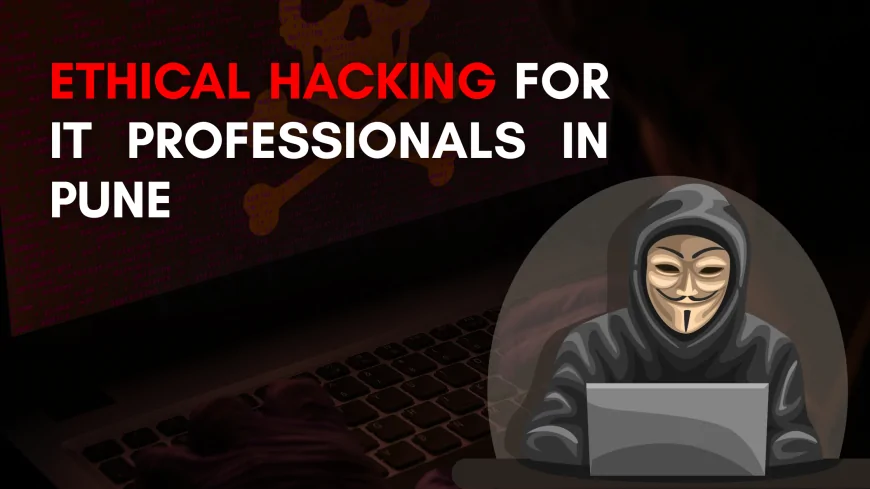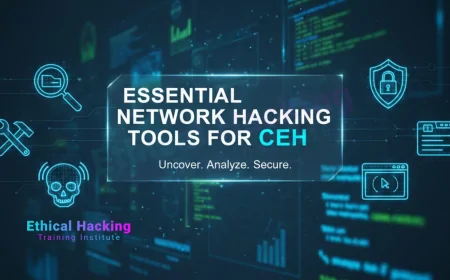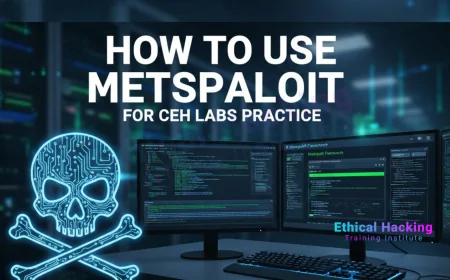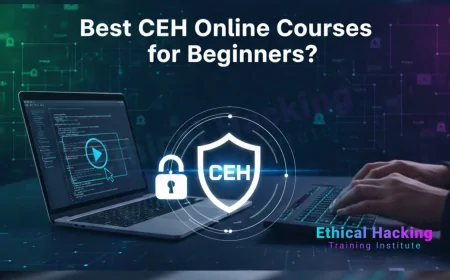Ethical Hacking Courses for IT Professionals in Pune | The Detailed Guide
Advance your cybersecurity career with ethical hacking courses for IT professionals in Pune. Learn hands-on skills, earn top certifications like CEH & OSCP, and explore flexible training tailored to working professionals. Unlock high-paying roles in cybersecurity today!

With cyberattacks growing in complexity and frequency, the demand for skilled ethical hackers has skyrocketed. In Pune, a city known for its vibrant IT sector, IT professionals are increasingly seeking ethical hacking courses to enhance their cybersecurity skills. Unlike basic entry-level programs, specialized ethical hacking courses tailored for IT professionals offer advanced knowledge, hands-on application, and career-aligned learning paths.
This blog delves deep into what sets these courses apart, why they matter for experienced tech workers, and how Pune’s training ecosystem supports upskilling in cybersecurity—without naming specific institutes or universities.
Why IT Professionals Need Ethical Hacking Skills
1. Bridging the Skill Gap
Even seasoned IT professionals often lack the hands-on cybersecurity expertise required to combat modern threats. Ethical hacking courses fill this critical skill gap by providing focused, real-world training.
2. Enhancing Job Security
Cybersecurity roles are among the most secure and high-paying jobs in the tech industry. Upskilling in ethical hacking ensures longevity in your career, especially as organizations prioritize digital protection.
3. Expanding Technical Proficiency
Courses help IT professionals deepen their understanding of areas like penetration testing, vulnerability assessment, secure coding, and risk mitigation.
Unique Course Highlights That Stand Out
1. Scenario-Based Learning Environments
Advanced ethical hacking courses in Pune adopt simulated attack environments to give learners real-world experience. Participants navigate through actual cyberattack scenarios to practice defense techniques.
2. Role-Specific Learning Modules
Whether you're a network engineer, system administrator, software developer, or cloud specialist, the courses often provide tailored tracks that match your current role, focusing on relevant tools and threat models.
3. Red and Blue Team Simulations
Many programs go beyond individual labs and incorporate red team (attacker) vs. blue team (defender) simulations. This interactive model sharpens critical thinking and teamwork in high-pressure situations.
4. Live Capture-The-Flag (CTF) Challenges
Courses may include regular CTF events, where learners solve cybersecurity puzzles in competitive timed environments. This gamification boosts retention and engagement.
5. Integration with DevSecOps
With DevOps teams playing a pivotal role in application delivery, integrating security into DevOps (DevSecOps) is crucial. Ethical hacking courses now include modules that align security with CI/CD pipelines.
Targeted Curriculum for IT Professionals
Ethical hacking courses for professionals differ from generic courses in the following ways:
-
Advanced Network Security
-
Cryptography and Steganography
-
Malware Analysis & Reverse Engineering
-
Cloud Infrastructure Hacking
-
Mobile & Web Application Testing
-
Incident Response and Threat Intelligence
Each module is curated to meet the needs of learners already familiar with foundational IT systems.
Flexibility That Fits Professional Schedules
1. Evening and Weekend Classes
Courses are often structured to accommodate working professionals, with sessions in the evening or on weekends.
2. Self-Paced Learning Options
Many platforms offer flexible timelines, allowing learners to progress at their convenience without missing critical concepts.
3. Blended Learning Formats
A mix of live sessions, recorded lectures, and lab exercises provides flexibility while ensuring comprehension.
Key Tools and Platforms Taught
Professionals are trained to use:
-
Kali Linux
-
Metasploit Framework
-
Wireshark
-
Burp Suite
-
Nessus
-
OpenVAS
-
Nmap
Learning these tools prepares students to execute professional penetration testing and secure their infrastructure proactively.
Certification Readiness
Most ethical hacking courses align with global certifications like:
-
Certified Ethical Hacker (CEH)
-
Offensive Security Certified Professional (OSCP)
-
CompTIA PenTest+
-
GIAC Penetration Tester (GPEN)
These certifications boost credibility and are often preferred by recruiters and cybersecurity teams.
Benefits Beyond Technical Skills
1. Strategic Thinking & Problem Solving
Hacking courses train you to think like an attacker, encouraging strategic mindset development and innovative defense planning.
2. Leadership Opportunities
By upskilling in cybersecurity, IT professionals open paths to roles like Security Architect, CISO, or Security Team Lead.
3. Cross-Functional Communication
Programs emphasize collaboration, requiring learners to explain security risks to non-technical stakeholders, improving their communication.
Career Advancements and Salary Uplift
In-Demand Roles After Completion:
-
Ethical Hacker
-
Penetration Tester
-
Cybersecurity Analyst
-
Security Operations Center (SOC) Analyst
-
Threat Hunter
-
Application Security Engineer
These roles often offer salaries significantly higher than average IT positions, particularly when backed by certifications and hands-on experience.
Learning Outcomes You Can Expect
-
Mastery in identifying and mitigating system vulnerabilities
-
Capability to ethically breach networks to expose weaknesses
-
Familiarity with modern hacking tools and real-time application
-
Preparation for leading cybersecurity certifications
-
Strategic knowledge to secure enterprise-level infrastructure
Continuing Support and Learning Pathways
Ethical hacking training providers in Pune often include post-course features such as:
-
Career counseling sessions
-
Resume and LinkedIn profile optimization
-
Access to alumni groups and cybersecurity communities
-
Regular workshops on emerging threats
How to Choose the Right Course
When selecting a course, IT professionals should consider:
-
Relevance to their current role or desired specialization
-
Practical exposure and lab access
-
Certification support
-
Trainer industry experience
-
Schedule compatibility
Reading reviews, attending demo sessions, or exploring curriculum previews can help make an informed decision.
Future-Proof Your IT Career
Cybersecurity is not just a trend—it's a necessity. As cybercriminals evolve, so must defenders. Ethical hacking equips IT professionals with the mindset, tools, and foresight to stay ahead in the cybersecurity game. Pune, with its tech-forward ecosystem, offers fertile ground for such growth.
FAQ's
1. Who should enroll in ethical hacking courses in Pune?
IT professionals such as system administrators, network engineers, developers, and cybersecurity analysts benefit the most. These courses help deepen security skills, prepare for certifications, and transition into specialized roles like ethical hacker or penetration tester.
2. What skills will I gain from ethical hacking training in Pune?
You'll learn penetration testing, vulnerability scanning, malware analysis, secure coding, cryptography, and real-world attack simulation using tools like Kali Linux and Metasploit. These skills prepare you to defend systems proactively.
3. Is ethical hacking a good career path for IT professionals?
Yes, it offers high job security, attractive salaries, and career growth. Ethical hackers are in demand across industries, making it a future-proof career option for IT professionals.
4. Are there flexible learning options available for working professionals?
Absolutely. Courses in Pune offer evening, weekend, and self-paced learning modes, allowing professionals to upskill without compromising their work schedule.
5. How long does an ethical hacking course in Pune typically take?
Course duration varies, but most professional-level programs run for 6–12 weeks, with options for intensive bootcamps and extended weekend batches.
6. What are the prerequisites for ethical hacking training?
Basic knowledge of networking, operating systems, and general IT concepts is helpful. Some advanced courses may require prior cybersecurity exposure or IT work experience.
7. Do ethical hacking courses in Pune offer hands-on labs?
Yes. Courses include virtual labs, real-world scenarios, and red vs. blue team exercises to help professionals apply theoretical knowledge to practical environments.
8. Will I receive a certificate after course completion?
Yes, most programs offer course completion certificates and preparation for global certifications like CEH, OSCP, or CompTIA PenTest+.
9. What tools are commonly taught in these courses?
You’ll gain hands-on experience with industry tools such as Kali Linux, Burp Suite, Metasploit, Wireshark, Nmap, Nessus, and OpenVAS, all essential for real-time threat analysis.
10. Are the courses aligned with global certifications?
Yes. Many training programs in Pune align their curriculum with CEH, OSCP, GPEN, and other recognized ethical hacking certifications.
11. Can ethical hacking help me shift from IT support to cybersecurity?
Definitely. Ethical hacking training bridges the skill gap for IT support professionals looking to transition into security roles like SOC Analyst or Threat Hunter.
12. What is the average salary of a certified ethical hacker in Pune?
Certified ethical hackers in Pune typically earn between ₹6 to ₹12 LPA, depending on experience, certifications, and job role.
13. How does ethical hacking training improve my cybersecurity mindset?
You learn to think like a hacker, which helps you anticipate and counter attacks. This mindset shift boosts your ability to secure networks and systems proactively.
14. Are evening classes effective for learning complex topics like ethical hacking?
Yes. Evening classes are structured for working professionals, with focused modules, interactive sessions, and regular practice labs that help in deep understanding over time.
15. Can developers benefit from ethical hacking training?
Absolutely. Developers learn secure coding practices, input validation, and common vulnerabilities in web and mobile applications—essential for building resilient software.
16. Are ethical hacking courses in Pune beginner-friendly?
Professional-level courses are designed for IT-experienced learners. However, foundation modules ensure you’re brought up to speed before diving into complex topics.
17. Do these courses include Capture-The-Flag (CTF) competitions?
Yes. Many programs include CTF challenges where professionals solve real-life cyber puzzles, enhancing their problem-solving and attack-response capabilities.
18. Will I receive job assistance after course completion?
Some training providers offer career counseling, resume reviews, mock interviews, and networking opportunities to help professionals land roles in cybersecurity.
19. How are these courses different from basic ethical hacking workshops?
They focus on depth over breadth, including advanced modules, real-world simulations, and tools integration. They're tailored for professionals, not absolute beginners.
20. Can these courses help me become a cybersecurity team lead or CISO?
Yes. With the right experience and skills gained from ethical hacking courses, you can move into leadership roles such as Security Architect, Team Lead, or even CISO over time.
Start Your Professional Hacking Career Today
For IT professionals in Pune, ethical hacking courses aren't just an option—they're a career accelerator. With flexible formats, advanced modules, and practical exposure, these courses offer a transformative opportunity to step into the future of secure technology.
What's Your Reaction?
 Like
0
Like
0
 Dislike
0
Dislike
0
 Love
0
Love
0
 Funny
0
Funny
0
 Angry
0
Angry
0
 Sad
0
Sad
0
 Wow
0
Wow
0

















